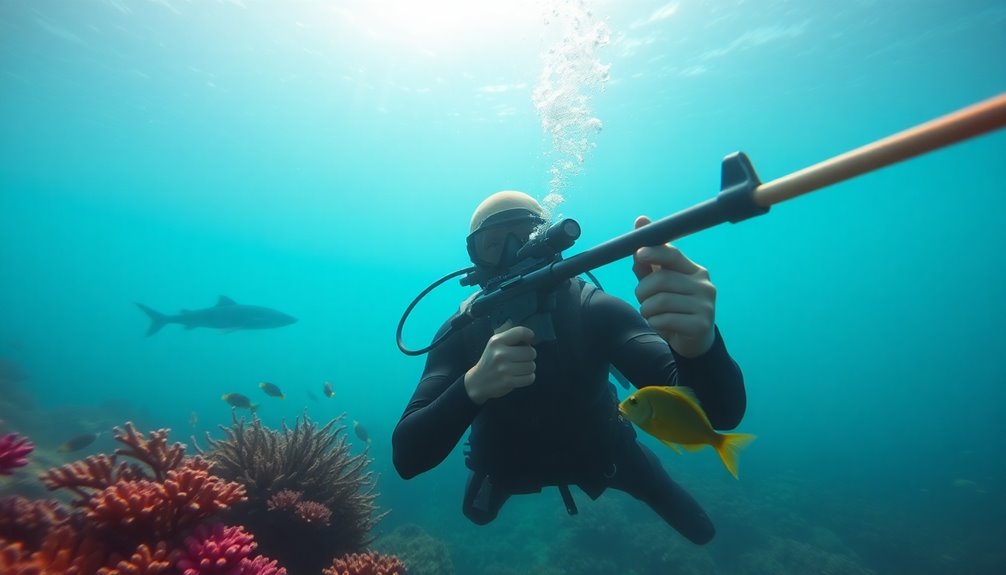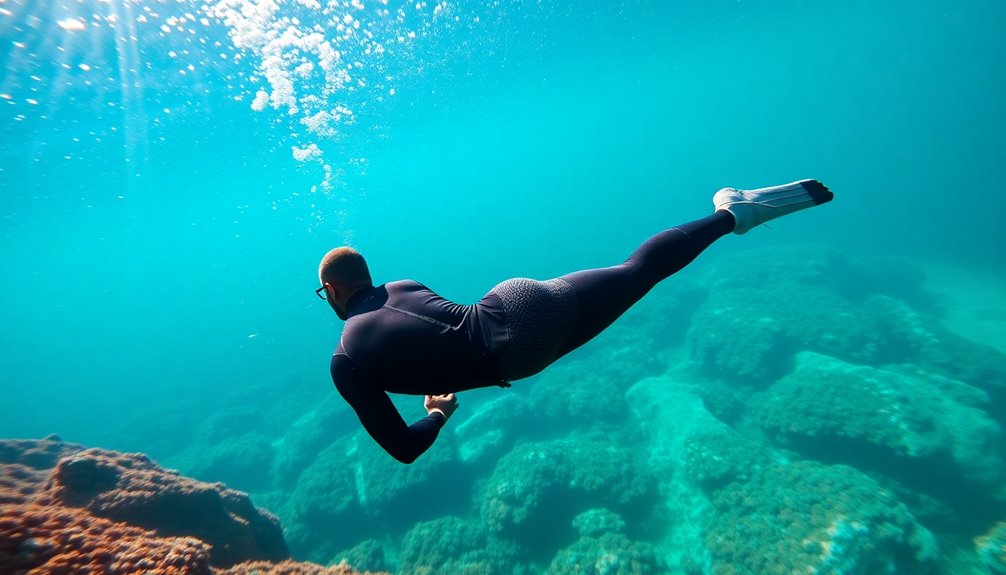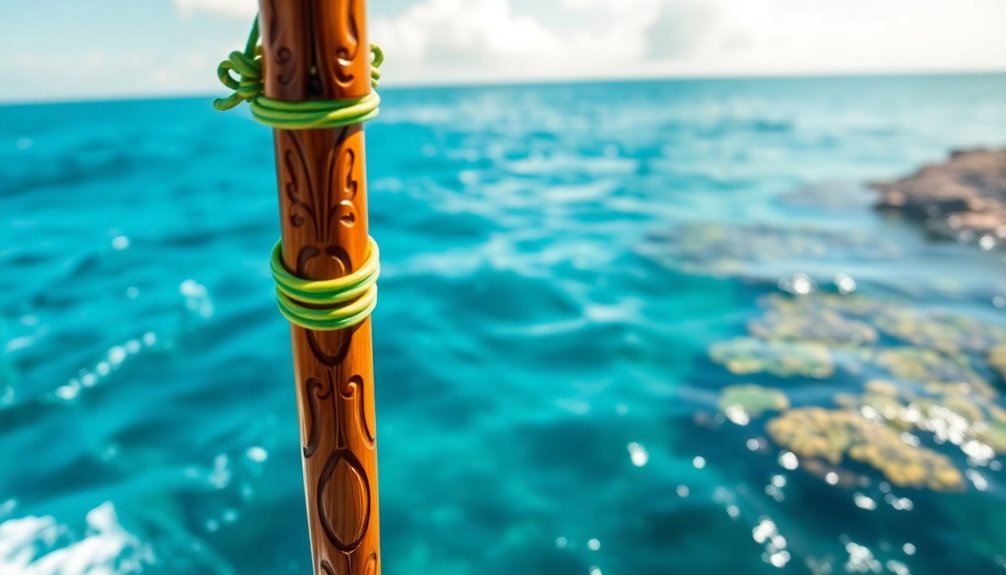Spearfishing can be super exciting, but it comes with risks you should know! Sharks might be curious about you, especially when there's splashing or a speared fish around. Always use your speargun safely, and check your equipment often to avoid accidents. It's important to be fit too, so your body is ready for the dive. Remember the ocean's health matters! Follow local laws to protect marine life. By being smart about safety and care, you can enjoy your adventures confidently. Dive in, and you'll discover even more tips to stay safe and have fun!
Key Takeaways
- Sharks may be attracted to spearfishers due to speared fish vibrations and blood, increasing the risk of encounters.
- Safety precautions, like never pointing a loaded speargun at others and maintaining equipment, are essential to prevent accidents.
- High physical fitness, including cardiovascular endurance and upper body strength, is crucial for safe and effective spearfishing.
- Understanding local regulations and targeting invasive species help protect marine biodiversity and reduce legal risks.
- Awareness of environmental threats, such as climate change and pollution, is vital for sustainable spearfishing practices.
Risks From Sharks

When it comes to spearfishing, one of the most significant risks you face is from sharks. These amazing creatures share the same waters and hunt the same fish you do. Often, when you're in the water, a shark might come to check you out. Most of the time, they're just curious, investigating for a few minutes before deciding what to do next.
However, if you've speared a fish, the vibrations and blood can attract them, making them more likely to get excited or even aggressive. In fact, many shark incidents are classified as provoked attacks due to their defensive actions when feeling threatened.
To help keep yourself safe, dive with a buddy. It's way more fun and adds extra safety! If you catch a fish, quickly stop the vibrations by cutting its gills or pithing it. Avoid murky water where surprises can happen.
Don't carry fish on a belt stringer or dive bag, as this can draw sharks closer. Instead, place your catches on a boat or land between dives.
If you do see a shark, maintain eye contact. Slowly move away without panicking. Remember, most sharks aren't out to get you, but being smart about your dive will keep your adventure safe and enjoyable!
Equipment Safety Precautions

Safety should always be a priority in spearfishing, especially when it comes to handling your equipment. When you're using a speargun, never point the muzzle or spear tip at anything you don't want to shoot. Keep your trigger finger outside the trigger guard to avoid accidental releases.
Always remember to load and use your speargun only in the water, and use the safety catch until just before you take your shot. Understanding creel limits is also important to ensure you're complying with regulations while spearfishing.
Before you jump into the waves, make sure your speargun is unloaded. After your adventure, rinse your speargun with fresh water to remove salt and debris. Regularly inspect the rubber band for any signs of wear, and replace it if necessary.
Lubricate the trigger mechanism to keep it working smoothly. When it comes to storage, avoid direct sunlight and extreme heat. Always unload your speargun before handing it to someone else, and pass it butt first to minimize risks.
Lastly, take good care of your additional gear, like your wetsuit and dive knife. Rinse and dry them after each dive to keep everything in top shape. Happy diving!
Health and Fitness Considerations

Spearfishing demands a high level of physical fitness, and conditioning plays a crucial role in your overall performance. You'll need strong cardiovascular endurance to swim long distances and fight against currents. Regular exercises like swimming, running, or cycling can boost your stamina by up to 20% in just a few months!
Upper body strength is essential too, as you'll be handling spearguns and catching fish. Doing pull-ups, push-ups, and using free weights can help you build the necessary muscle power. Additionally, proper training significantly reduces accident risks among divers, ensuring you can handle the physical demands safely.
Flexibility is just as important; it helps you move through the water easily and lowers the risk of cramps or injuries. You might consider adding yoga or Pilates to your routine for that extra boost.
Breath-hold training is vital for spending more time underwater. Techniques like CO2 and O2 tables can help, but always practice with a buddy to stay safe. Remember to improve your breath-hold time gradually.
Lastly, a balanced diet rich in proteins, healthy fats, and carbohydrates gives you the energy you need. Foods like spinach, avocados, and nuts can help your body perform at its best.
Environmental Hazards

In the depths of our oceans, environmental hazards pose significant challenges to the practice of spearfishing. Climate change, pollution, and habitat destruction are serious threats to ocean life. When you spearfish, it's important to think about how your actions might affect the underwater world.
For example, targeting larger fish can change the balance of fish populations, impacting their ability to reproduce. This can lead to fewer fish overall and threaten the health of the ecosystem. Engaging in sustainable practices is crucial to maintaining the delicate balance of marine life.
Spearfishing in protected areas can also create problems. These areas are meant to help fish and other marine creatures thrive, but unauthorized fishing can hurt these efforts. You might be surprised to learn that sometimes, protected spots don't have more fish due to illegal fishing activities!
To help the environment, consider using sustainable practices. Focus on targeting invasive species that harm natural habitats.
Legal and Conservation Issues

Navigating the legal and conservation landscape of spearfishing requires you to stay informed about the various regulations that apply in your area.
In many places, like Europe, spearfishing on scuba is illegal, while in the US, it's often permitted, unless local laws say otherwise. For example, in New York, you can spearfish in freshwater, but you need to follow rules about size and season.
Conservation is also important. Spearfishing can help protect young fish by allowing you to target only mature ones. However, it's essential to be aware of species that need protection, like marine turtles. These fish and other animals need our help to thrive.
Marine Protected Areas are designed to keep ecosystems healthy, but spearfishing there can harm these efforts. Moreover, illegal spearfishing contributes to the decline of marine biodiversity, making it even more crucial to adhere to local regulations.
That's why knowing where you can fish is crucial.
Frequently Asked Questions
What Should I Do if I Encounter a Shark While Diving?
If you spot a shark while diving, don't panic! Stay calm and keep your movements slow and steady.
Face the shark and maintain a horizontal position to look larger. Watch its behavior carefully; if it seems curious, be ready. Avoid swimming away, as this can make it chase you.
If you need to defend yourself, use an object to block it. Remember, staying calm helps you make smart choices in this thrilling moment!
How Can I Improve My Fitness for Spearfishing?
To improve your fitness for spearfishing, start with regular cardio exercises like swimming, running, or cycling.
These boost your endurance and help you swim longer.
Don't forget strength training, too! Push-ups and pull-ups build your upper body strength.
Adding flexibility exercises like yoga will keep you limber and reduce injuries.
Lastly, practice breath-holding techniques to stay underwater longer.
With a balanced diet, you'll feel strong and ready for your next adventure!
What Are the Best Practices for Storing My Speargun?
To store your speargun properly, start by rinsing it with fresh water to remove salt.
Dry it completely, especially metal parts, to avoid rust.
Take off the rubber bands and keep them in a cool place.
Remove the shaft and store it safely.
Make sure it's in a dry area, away from sunlight.
Consider using a protective bag for extra safety.
Always unload your speargun before storing it to stay safe!
Can I Spearfish in Protected Marine Areas?
You can't always spearfish in protected marine areas. Some places, like ecological reserves, have strict no-spearfishing rules.
Other areas might allow it but with special rules. Always check local guidelines, because spearfishing in the wrong spot can lead to fines and hurt the ocean's balance.
If you’re unsure, ask local experts! They can help you find safe areas where you can enjoy spearfishing while protecting our beautiful marine life. Spearfishing in Miami is a popular activity, but it’s important to make sure you are following all local regulations and guidelines to ensure the protection of the marine ecosystem. Local experts can also provide valuable tips on responsible spearfishing practices, such as only targeting non-endangered species and properly disposing of any bycatch. By seeking guidance from those who know the area best, you can have a fun and sustainable spearfishing experience in Miami.
Have fun!
What Are the Signs of Shallow Water Blackout?
When you're in the water, watch for signs of shallow water blackout. You mightn't see any struggle or panic, but someone could suddenly lose consciousness.
If a swimmer isn't breathing or takes in water, that's a serious signal! Remember, brain damage can happen quickly without help.
Always dive with a buddy and stay aware of your limits. Safety first means everyone can enjoy the water together!
Stay smart and have fun!
Conclusion
Spearfishing can be a thrilling adventure, but it's important to stay safe! By understanding the risks, like sharks and equipment safety, you can dive smarter. Keeping fit and being aware of the environment also helps. Plus, knowing the legal rules protects our oceans. So, gear up, respect nature, and enjoy the excitement of spearfishing! With the right precautions, you can have a fantastic time while staying safe. Dive in and make great memories!










